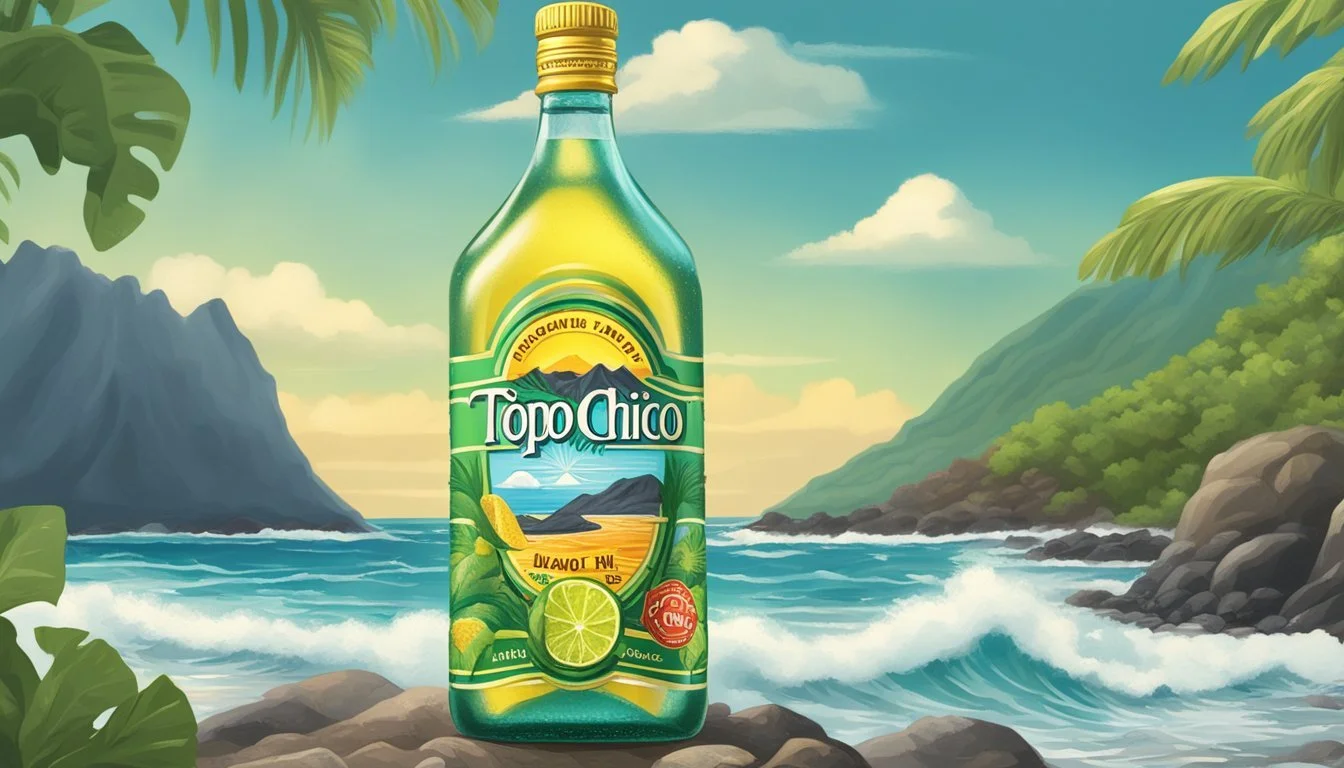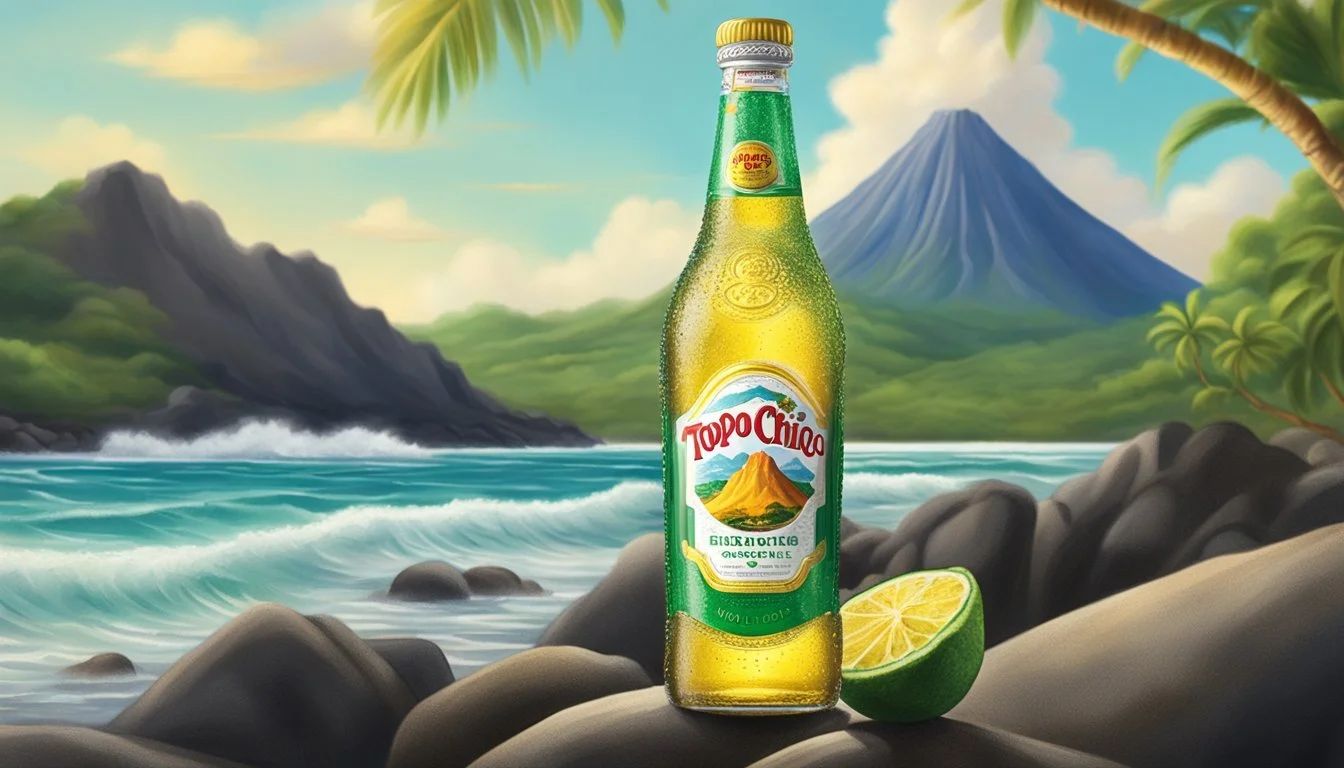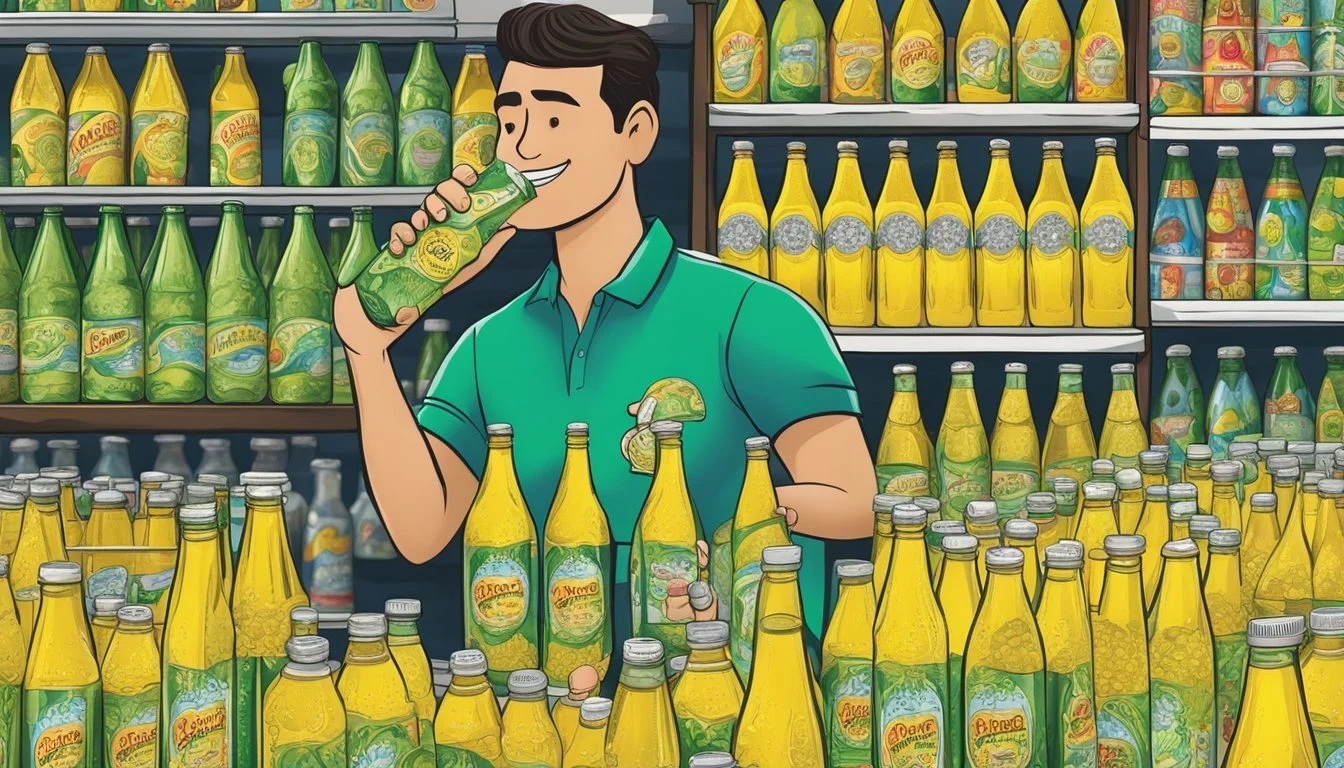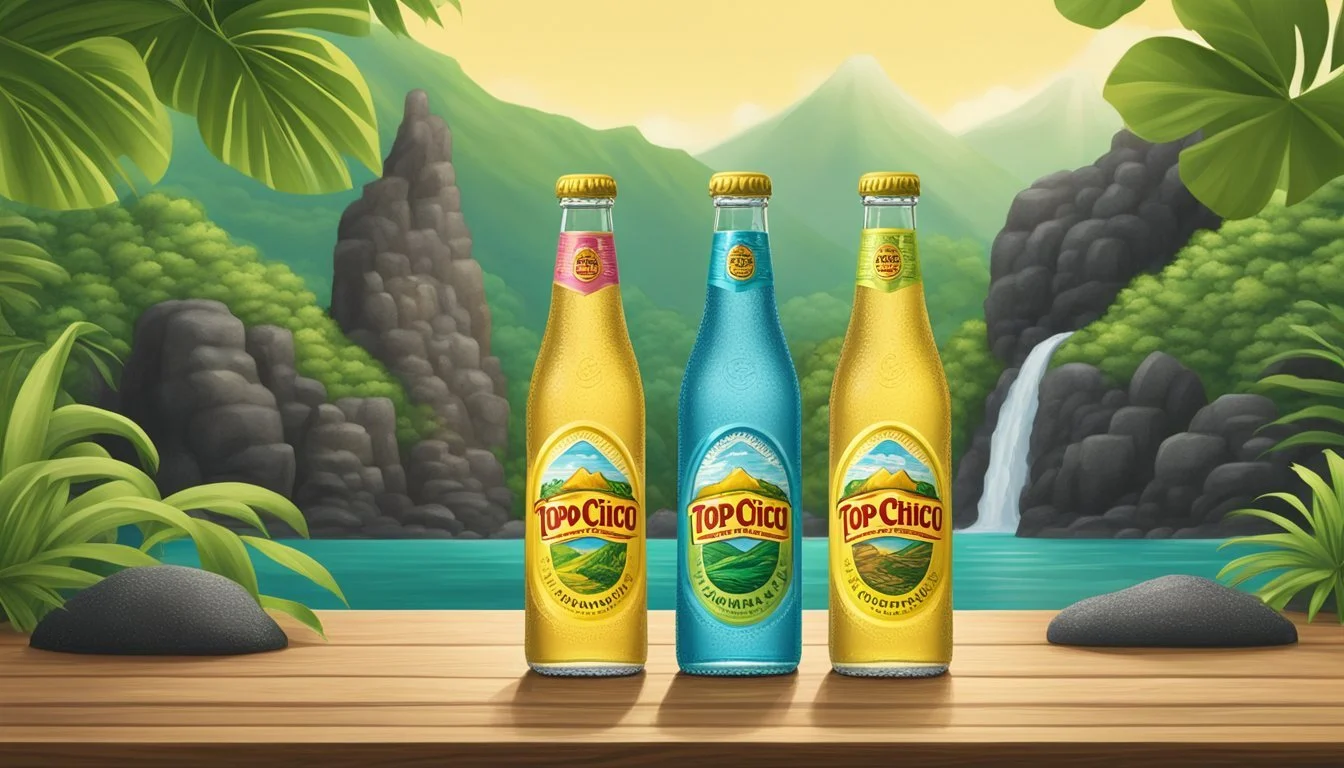Topo Chico vs. Hawai’i Volcanic
Which Bottled Water is Better?
When it comes to choosing between Topo Chico and Hawai’i Volcanic bottled waters, one must consider the differences in taste, mineral content, and health benefits. Topo Chico, a sparkling mineral water from Mexico, is renowned for its carbonation and unique mineral profile, including calcium, magnesium, and potassium. On the other hand, Hawai’i Volcanic offers a still water option with a naturally alkaline pH level of 7.7 to 8.4.
For those who prefer a fizzy refreshment, Topo Chico’s lively bubbles and crisp taste often win over sparkling water enthusiasts. Conversely, Hawai’i Volcanic appeals to consumers seeking a smooth, still mineral water with potential health benefits from its alkaline properties. Both brands provide distinct experiences, catering to different preferences and uses.
In comparing the two, it becomes apparent that the best choice depends on personal taste and desired health benefits. Topo Chico delivers a refreshing, effervescent experience, while Hawai’i Volcanic offers a naturally alkaline water that can help neutralize stomach acid. Readers are invited to explore more about these two exquisite water brands to determine which best suits their hydration needs.
Context and Origin
Topo Chico and Hawai’i Volcanic are two distinct bottled water brands with deep historical roots and unique sourcing methods, offering consumers not just hydration but a glimpse into regional natural treasures and cultural legacies.
Origins of Topo Chico
Topo Chico originates from Monterrey, Mexico, and its name is drawn from the Cerro del Topo Chico, a nearby inactive volcano. The water source has been utilized since the 19th century, originally tapped for its reputed therapeutic properties. Legends suggest that indigenous people revered the mineral-rich springs for their healing potential.
Production started in 1895, and the brand has since become a staple in Mexican households and beyond. Topo Chico's mineral composition is naturally balanced, drawn from deep underground springs, giving it a crisp, effervescent quality. It has carved a niche in the U.S. market, especially within the beverage industry as a favored mixer for cocktails.
Historical Significance of Hawai’i Volcanic
Hawai’i Volcanic water is sourced from aquifers located beneath the ancient, porous lava rock of the Mauna Loa Volcano in Hawaii. This natural filtration process enriches the water with minerals and imparts a slightly sweet, smooth taste. The volcanic origin lends significant cultural and geological importance, embodying the pristine environment of the Hawaiian Islands.
The brand capitalizes on its alkaline properties, which are often marketed as beneficial for neutralizing stomach acid and promoting general wellness. Hawai’i Volcanic connects consumers to the majestic landscape of Hawaii, offering a taste of its unique volcanic geology. The brand emphasizes sustainability and respect for natural resources, reflecting the cultural values inherent in Hawaiian traditions.
Product Comparison
Topo Chico and Hawai’i Volcanic differ in various aspects such as mineral content, taste, packaging, and health benefits. Detailed insights provide clarity on how each brand stands out.
Mineral Content Analysis
Mineral content significantly impacts the quality and health benefits of bottled water. Topo Chico is known for its high mineral content, including magnesium, calcium, and potassium. These minerals can support bone health and hydration.
Hawai’i Volcanic, characterized by its alkaline pH levels ranging from 7.7 to 8.4, offers a balanced mineral profile with electrolytes that support overall body functions. Its moderate sodium content also makes it a viable option for those monitoring their salt intake.
Mineral Topo Chico Hawai’i Volcanic Magnesium High Moderate Calcium High Moderate Potassium High Moderate Sodium Moderate Low
Taste and Flavor Profiles
Taste preferences are highly subjective, yet crucial in choosing bottled water. Topo Chico is noted for its crisp, mineral-rich taste with subtle citrus hints, making it a refreshing option. The effervescence further enhances its overall flavor experience.
Hawai’i Volcanic, conversely, is praised for its smooth, clean taste. The absence of strong mineral flavors makes it appealing to those who prefer a milder water taste. Consumers often describe it as having a naturally pure essence.
Packaging and Sustainability
Packaging plays a crucial role in environmental impact and user convenience. Topo Chico is widely available in glass bottles and plastic bottles, which are recyclable, though plastic poses environmental concerns.
Hawai’i Volcanic opts for recyclable PET plastic, which is BPA-free and deemed environmentally friendlier. Their commitment to sustainability includes using eco-friendly materials and supporting various conservation efforts, reducing their overall environmental footprint.
Health Benefits and Hydration
When evaluating health benefits, both brands offer unique advantages. Topo Chico, enriched with electrolytes, aids in hydration and supports muscle function. Its mineral content, particularly calcium and magnesium, contributes to bone health.
Hawai’i Volcanic’s alkaline nature helps neutralize stomach acid, potentially offering relief for acid reflux sufferers. Its balanced mineral content ensures adequate hydration while providing essential nutrients. The pH level of 7.7 to 8.4 also promotes balanced body pH levels.
Carbonation Levels
Carbonation levels influence both texture and taste experience. Topo Chico’s high carbonation gives it a distinctive effervescence that many find invigorating. The sparkling quality enhances the perception of freshness and crispness.
Hawai’i Volcanic, while available in both still and sparkling varieties, maintains a light carbonation in its sparkling version. This softer fizziness appeals to those who prefer a gentler bubbling sensation without overpowering the palate.
Sourcing and Production
Topo Chico and Hawai’i Volcanic take distinct approaches to sourcing, production processes, and environmental practices. This section explores how these differences impact the quality and sustainability of each brand.
Water Sources and Extraction
Topo Chico is known for its mineral water, sourced from a spring in Monterrey, Mexico. This natural spring water is said to originate from underground aquifers, which naturally filter and mineralize the water over time. It boasts a naturally carbonated profile right from the source.
Hawai’i Volcanic sources its water from the Big Island of Hawai’i, tapping into aquifers fed by rainfall filtered through volcanic rock. This volcanic filtration is a key selling point, as it adds unique minerals and taste characteristics to the water.
Production Processes
Topo Chico employs a series of filtration and purification steps to ensure water quality. The water undergoes natural filtration through minerals, further processed to maintain its mineral composition.
On the other hand, Hawai’i Volcanic emphasizes its volcanic filtration and the minimal processing required to meet safety standards set by the Food and Drug Administration (FDA) and Environmental Protection Agency (EPA). The water is typically bottled at its source to preserve its natural mineral content.
Environmental Practices and Impact
Topo Chico has made strides in reducing its environmental impact by cutting PFAS chemical levels in its products. This is part of their broader commitment to sustainability and reducing plastic waste.
Hawai’i Volcanic focuses on using recycled PET (RPET) bottles and aluminum cans, materials that are more environmentally friendly compared to traditional plastics. Their efforts also extend to conserving the natural sources of their water by bottling less than 0.003% of the water yielded annually. These sustainability practices align with a conscientious approach to environmental protection and conservation.
Regulations and Standards
Understanding the regulations and standards for bottled water can guide consumers in making informed choices. This section explores safety standards and the necessary certifications for compliance.
Bottled Water Safety Standards
Bottled water sold in the United States must comply with safety standards set by the FDA. These standards ensure that bottled water is safe for human consumption, targeting various contaminants including PFAS. The FDA mandates regular testing by manufacturers to detect contaminants and verify alkalinity, acidity, and pH levels. Both Topo Chico and Hawai’i Volcanic follow these requirements to maintain high-quality products.
High levels of PFAS chemicals found previously in Topo Chico have been notably reduced in recent tests. Regular monitoring helps ensure that brands adhere to regulated safety protocols, protecting consumer health. Alkaline water like Hawai'i Volcanic is often tested for its pH levels to ensure they remain in the slightly alkaline range, non-acidic, and within safe consumption limits.
Certifications and Compliance
Certifications indicate that a bottled water brand has met or exceeded regulatory compliance. Topo Chico and Hawai’i Volcanic aim to uphold trust by acquiring relevant certifications. Topo Chico, for instance, continues to focus on reducing contaminant levels, striving for recognition in water purity.
Hawai’i Volcanic emphasizes its compliance through certifications that back its unique electrolysis process, which maintains mineral content and water quality. This process ensures the water stays free from harmful contaminants and meets the expected safety and health standards. Overall, both brands are committed to complying with federal and state regulations to assure customers of their product safety.
Market Presence and Trends
Topo Chico and Hawai’i Volcanic have distinct positions in the bottled water market, influenced by their sales strategies, consumer perceptions, and competition.
Sales and Distribution
Topo Chico has a strong presence in North America, prominently featured in both grocery stores and online platforms like Amazon. Its distribution network is extensive, facilitated by its association with major beverage companies. Hawai’i Volcanic targets premium markets, focusing on high-end retail outlets and health food stores, leveraging its unique volcanic source. This niche approach limits its widespread availability but enhances its appeal to a discerning customer base.
Consumer Perception and Marketing
Topo Chico is celebrated for its intense carbonation and crisp flavor, endorsed by its cult-like following. Marketing efforts highlight its origins in Monterrey, Mexico, appealing to consumers seeking authenticity. Hawai’i Volcanic emphasizes purity and sustainability, using eco-friendly packaging and promoting its Hawaiian volcanic source. Its branding attracts health-conscious consumers valuing natural and unprocessed products, distinguishing it from competitors like Essentia and Waiakea.
Competitor Analysis
Topo Chico competes with brands like LaCroix and Spindrift in the sparkling water segment, relying on its unique mineral content and carbonation. Hawai’i Volcanic's competition includes premium still water brands such as Mountain Valley and Antipodes5. Though it faces stiff competition, its USP of volcanic origin and eco-friendly practices sets it apart, positioning it uniquely in the premium bottled water market.
Usage and Applications
Both Topo Chico and Hawai’i Volcanic offer unique benefits in culinary practices and daily hydration due to their distinct characteristics. This section explores how each can be best utilized in cooking, mixology, and daily drinking habits.
Culinary and Mixology Applications
Topo Chico is a popular choice for cocktails due to its high carbonation and mineral content.
For cocktails like the classic Ranch Water, which combines Tequila and lime juice, Topo Chico adds a refreshing sparkle.
Chefs often use it to lightly carbonate batters and doughs.
Hawai’i Volcanic has a naturally alkaline pH, making it ideal for cooking and mixing drinks that benefit from a smoother texture.
It’s a preferred ingredient for hydration-focused cocktails such as alkaline-based mocktails.
The water's purity enhances the natural flavors of ingredients without adding any metallic taste.
Daily Consumption and Hydration
Topo Chico's mineral content makes it a favorite for daily hydration needs.
Rich in minerals, it enhances daily electrolyte intake.
The carbonation provides a satisfying alternative to sugary sodas, supporting better hydration habits.
Hawai’i Volcanic's alkaline nature is beneficial for regular consumption.
The higher pH level can help balance body acidity levels, which some find beneficial.
Its smooth taste and subtle mineral profile make it a refreshing choice for daily drinking and hydration.
In both categories, these waters offer specific advantages based on their unique properties, making them suitable for different preferences and needs.
Final Assessment
When comparing Topo Chico and Hawai’i Volcanic, several factors come into play. Highlighting key points helps in understanding which one stands out.
Purity
Topo Chico has been scrutinized for containing PFAS chemicals. Despite efforts to reduce these, concerns remain. Hawai’i Volcanic, sourced from Mauna Loa aquifers, boasts natural filtration through volcanic rock, generally indicating purer water.
Taste
Topo Chico offers a crisp, fizzy experience, popular among carbonated water enthusiasts. Hawai’i Volcanic provides a smooth, slightly sweet taste, attributed to its natural minerals.
Mineral Balance
Hawai’i Volcanic contains naturally occurring minerals like calcium, magnesium, and potassium, contributing to its balanced pH of 7.7 to 8.4. This alkaline nature is often associated with neutralizing stomach acid. Topo Chico, while mineral-rich, focuses more on its sparkle.
Environmental Impact
Sourcing methods and packaging significantly impact the environment. Hawai’i Volcanic emphasizes sustainable practices, leveraging renewable resources. Topo Chico, now part of Coca-Cola, has also made moves to reduce its environmental footprint, particularly regarding PFAS reduction.
Water Quality
Water quality encompasses more than just taste and purity. Hawai’i Volcanic’s alkaline properties and trace minerals may offer additional health benefits. Topo Chico, despite its strong market presence, must address lingering concerns over chemical content.
Utilizing such criteria provides a comprehensive side-by-side evaluation. Each brand has unique strengths appealing to different preferences.
More About Topo Chico
More About Hawai’i Volcanic
Acqua Pana vs Hawaii Volcanic: Which Bottled Water is Better?
Antipodes vs Hawaii Volcanic: Which Bottled Water is Better?
Aqua Carpatica vs Hawaii Volcanic: Which Bottled Water is Better?
Arrowhead vs Hawaii Volcanic: Which Bottled Water is Better?
Boxed Water vs Hawaii Volcanic: Which Bottled Water is Better?
Castle Rock vs Hawaii Volcanic: Which Bottled Water is Better?
Core Hydration vs Hawaii Volcanic: Which Bottled Water is Better?
Deer Park vs Hawaii Volcanic: Which Bottled Water is Better?
Hawaii Volcanic vs 1907water: Which Bottled Water is Better?
Hawaii Volcanic vs Alkaline88: Which Bottled Water is Better?
Hawaii Volcanic vs Big Chill: Which Bottled Water is Better?
Hawaii Volcanic vs BodyArmor: Which Bottled Water is Better?
Hawaii Volcanic vs Cascade Mountain: Which Bottled Water is Better?
Hawaii Volcanic vs CBD Living: Which Bottled Water is Better?
Hawaii Volcanic vs Crystal Geyser: Which Bottled Water is Better?
Hawaii Volcanic vs Crystal Lake: Which Bottled Water is Better?
Hawaii Volcanic vs Essence pH10: Which Bottled Water is Better?
Hawaii Volcanic vs Kirkland Signature: Which Bottled Water is Better?
Hawaii Volcanic vs Liquid Death: Which Bottled Water is Better?
Hawaii Volcanic vs Open Water: Which Bottled Water is Better?
Hawaii Volcanic vs Proud Source: Which Bottled Water is Better?
Hawaii Volcanic vs Pure Life: Which Bottled Water is Better?
Hawaii Volcanic vs Purely Sedona: Which Bottled Water is Better?
Hawaii Volcanic vs Richard's Rainwater: Which Bottled Water is Better?
Hawaii Volcanic vs Simple Truth: Which Bottled Water is Better?
Hawaii Volcanic vs Talking Rain AQA: Which Bottled Water is Better?
Hawaii Volcanic vs Weird Water: Which Bottled Water is Better?
Hawaii Volcanic vs Whole Foods 365: Which Bottled Water is Better?
Hawaii Volcanic vs Whole Foods Italian Still Mineral water: Which Bottled Water is Better?
Hawaiian Springs vs Hawaii Volcanic: Which Bottled Water is Better?
Ice Mountain vs Hawaii Volcanic: Which Bottled Water is Better?
Icelandic Glacial vs Hawaii Volcanic: Which Bottled Water is Better?
Just Water vs Hawaii Volcanic: Which Bottled Water is Better?
Mountain Valley Spring Water vs Hawaii Volcanic: Which Bottled Water is Better?
Nestle Pure Life vs Hawaii Volcanic: Which Bottled Water is Better?
Poland Spring vs Hawaii Volcanic: Which Bottled Water is Better?
San Pellegrino vs Hawaii Volcanic: Which Bottled Water is Better?
Smartwater vs Hawaii Volcanic: Which Bottled Water is Better?
Solan de Cabras vs Hawaii Volcanic: Which Bottled Water is Better?
Zephyrhills vs Hawaii Volcanic: Which Bottled Water is Better?









